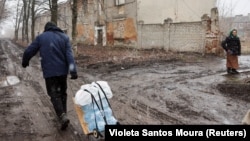When water services are disrupted or destroyed by armed conflict, humanitarian consequences are severe and far reaching, according to Robert Martini, Director General of the Committee of the Red Cross. That’s because water services are interconnected. It’s not just about water delivery and sanitation, but also about availability, maintenance and repairs, replacement parts and staff who must be available to do the work and not be prevented by conflict from doing so.
“A 2022 study by the University of California Los Angeles estimated that almost half of the world’s population will suffer severe water stress by 2030,” said United States Acting Deputy Representative to the United Nations, Jeffrey DeLaurentis. Although the causes of this crisis are many, conflict and climate change are two of the main drivers, he said. “For those that live in conflict zones, being cut off from water or sanitation can have devastating consequences.”
“Increasingly, we see the impact that conflict-driven water insecurity has on displacement and gender-based violence,” he said. “In some conflicts, armed forces are damaging water infrastructure and controlling access to headwaters.”
Ambassador DeLaurentis offered as an example the devastation caused by Russia’s attacks on Ukraine:
“In Ukraine, Russian forces have attacked water infrastructure and left over 11 million Ukrainians – or one quarter of Ukraine’s population – without reliable access to clean water. It’s beyond cruel.”
And Russia continues to attack Ukrainian water systems, including wetlands that help keep water clean. “The United States welcomed the adoption of a resolution under the Ramsar Convention that called upon Russia to cease abuses that prevent Ukraine from protecting, restoring, and using its wetlands,” said Ambassador DeLaurentis.
On a related note, “We cannot talk about water insecurity without talking about climate change,” he said. “We know that water scarcity can trigger the onset or escalate intercommunal conflict between groups or states. And we know that climate-related severe weather events, including floods and droughts, affect the ability of vulnerable communities to produce food in ways they have used for generations.”
The United States recently announced a commitment to investing up to 49 billion dollars toward equitable, climate-resilient water and sanitation investments – at home and around the world. However, “None of us can do this alone. Addressing water insecurity requires global cooperation,” said Ambassador DeLaurentis. “We have an obligation to address water scarcity, which exacerbates conflicts and disrupts peace and security.”
“People need water,” Ambassador DeLaurentis said. “So, peace means water. It’s that simple.”






